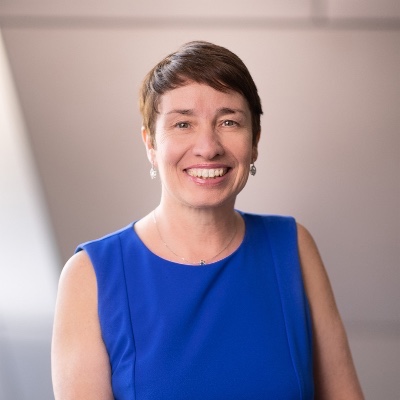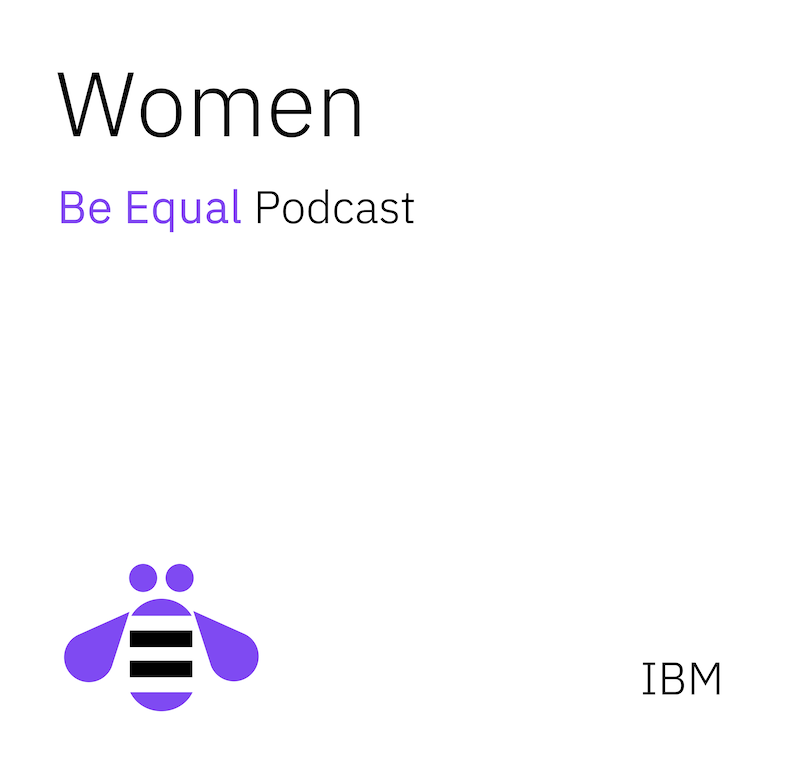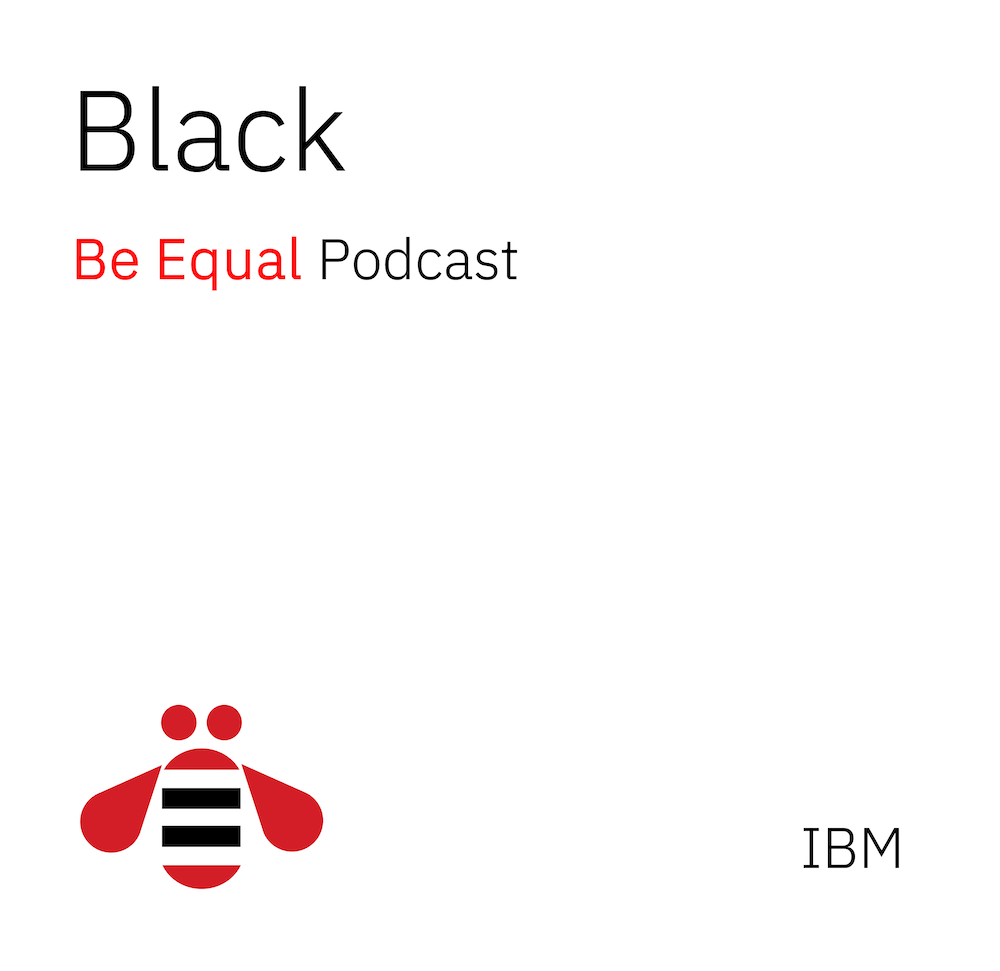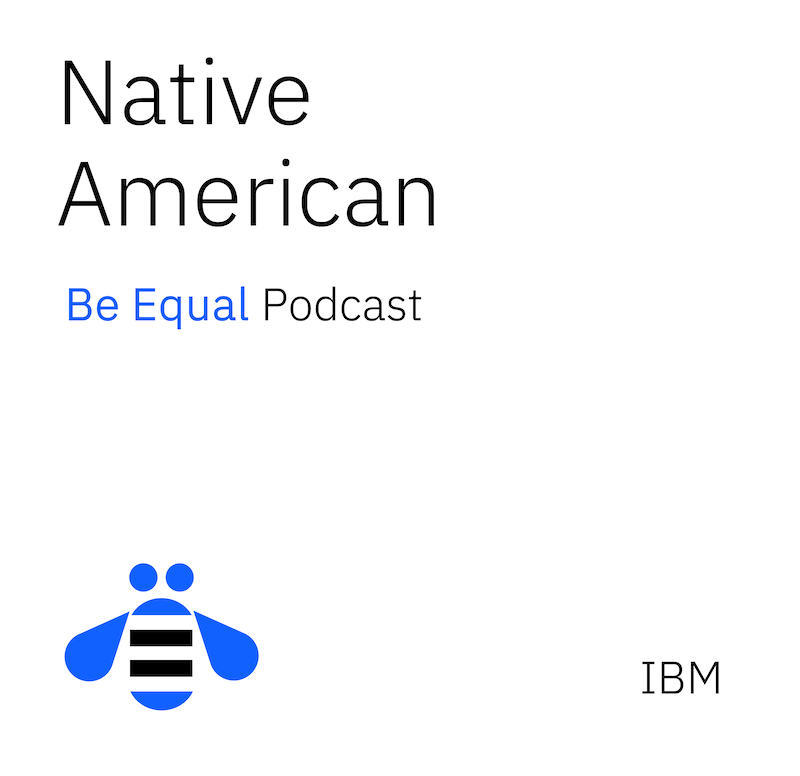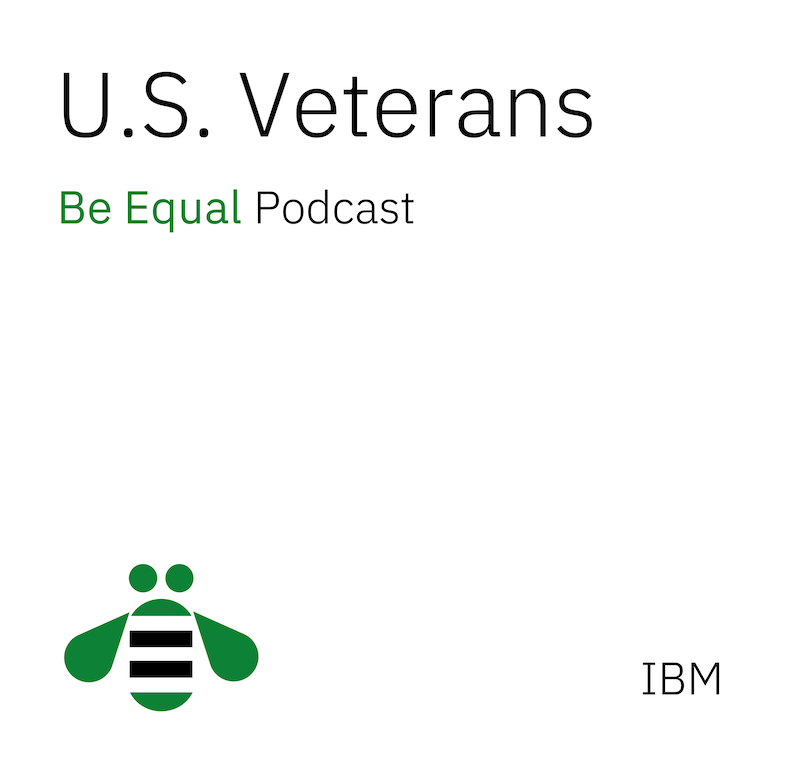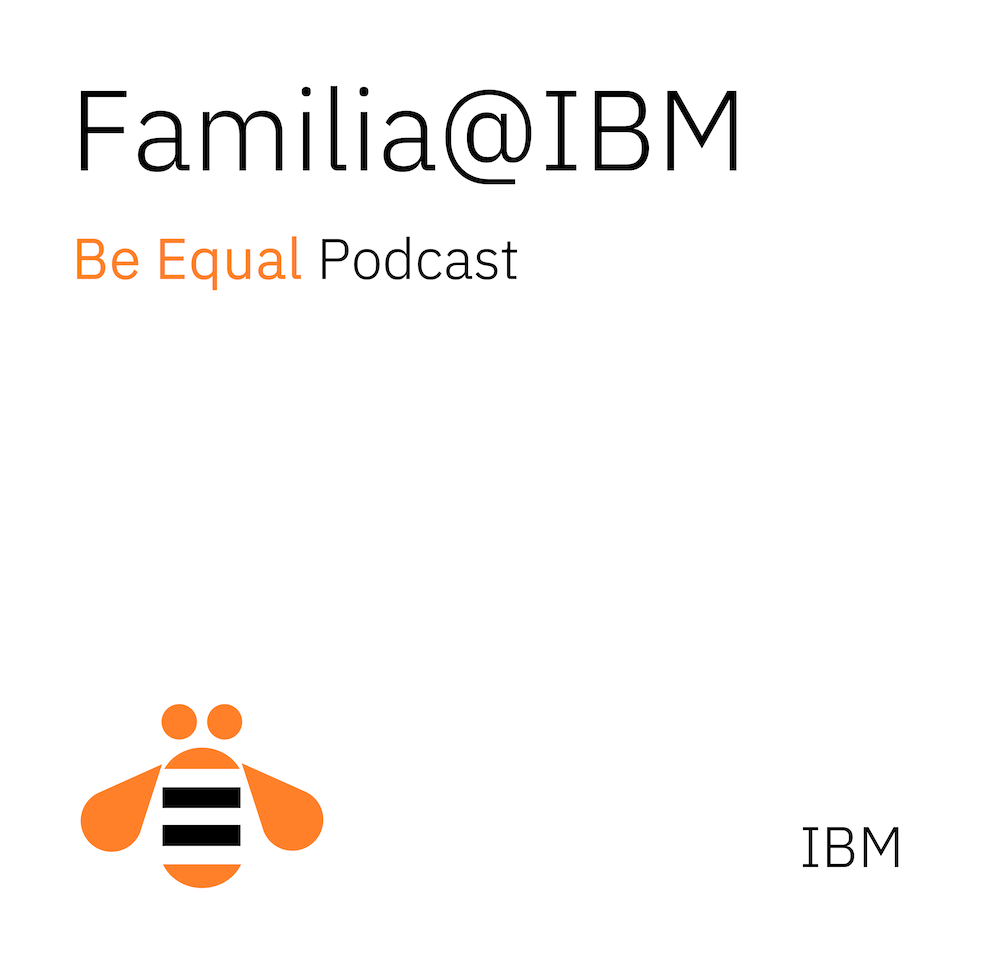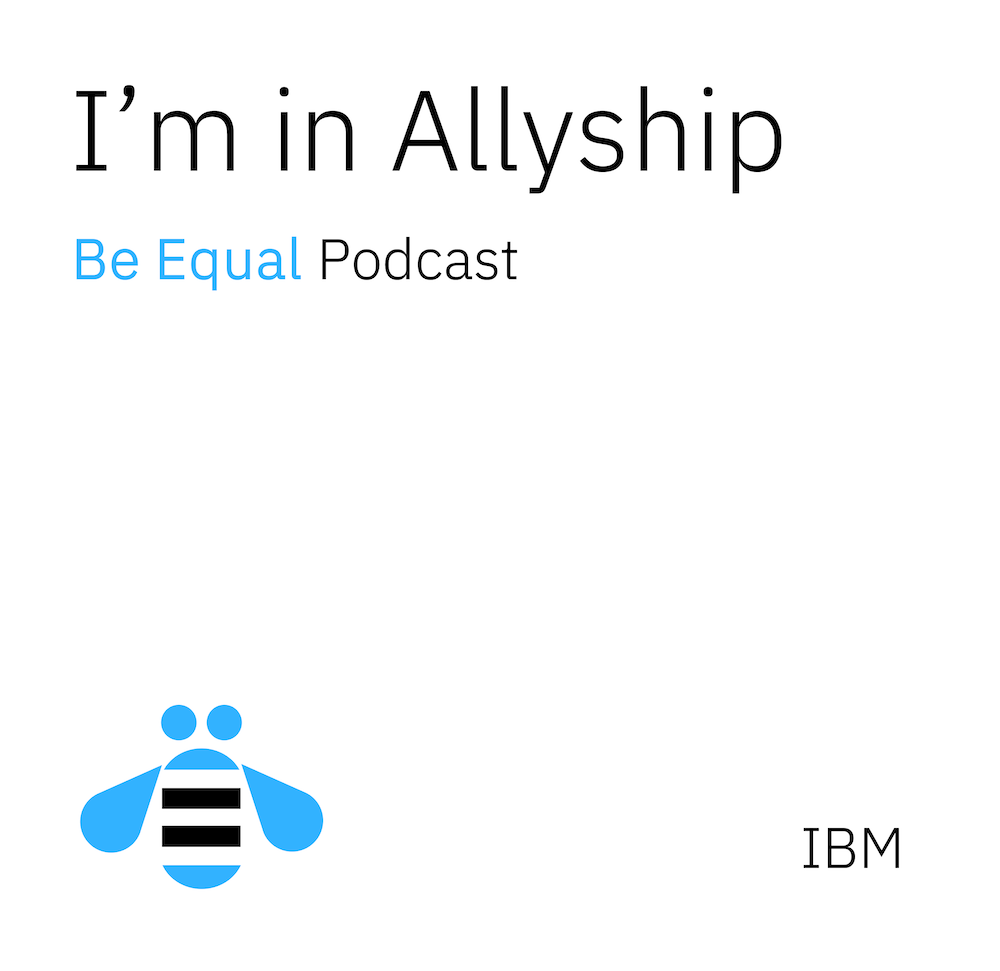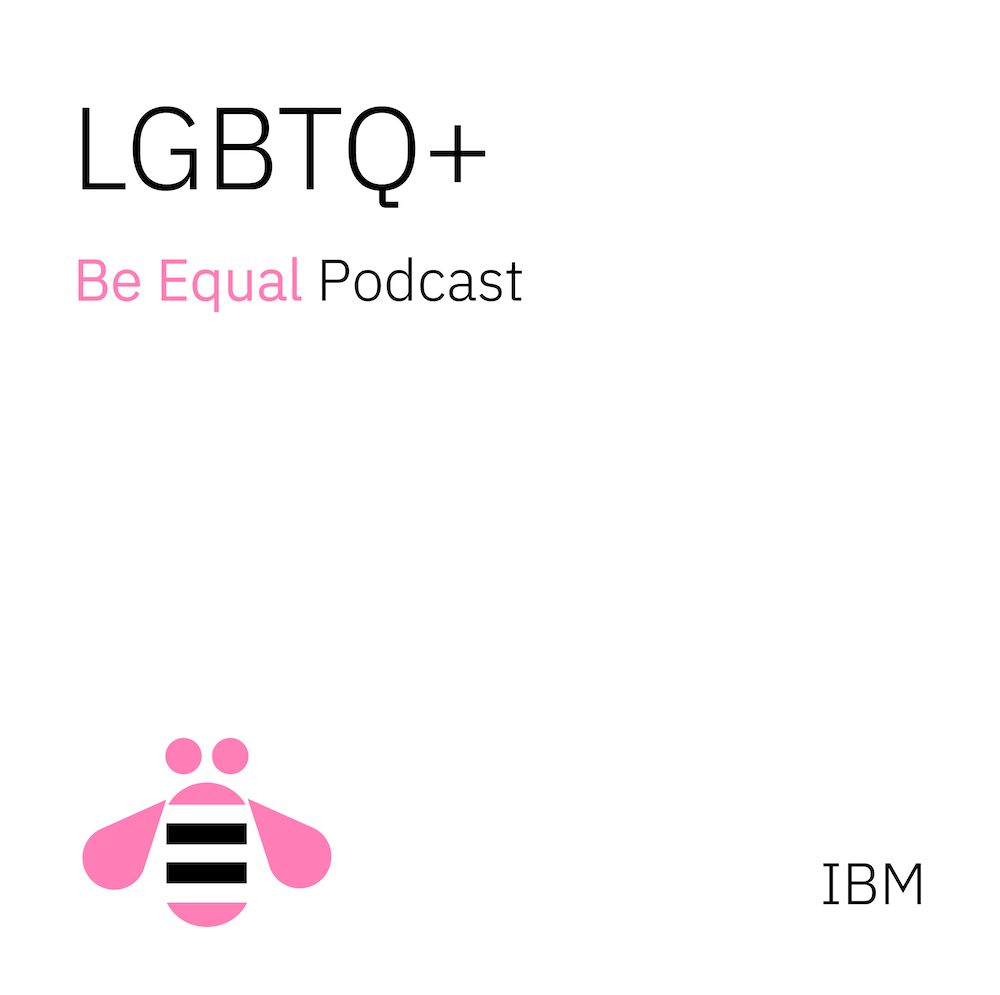Women's History Month – Inspire Inclusion
- 0.5
- 1
- 1.25
- 1.5
- 1.75
- 2
Jill Stewart: Hello and welcome to our IBM Be Equal podcast. I'm Jill Stewart, the Director of Diversity and Inclusion at IBM. Thanks for joining our conversation around D&I to learn how we at IBM are continuously looking for ways to expand equality and allyship across the enterprise. We have eight D&I communities focused on making a difference for underrepresented groups, and here is an opportunity for you to hear directly from our IBMers. Every month we have a new episode, so enjoy.
Joy Dettorre: So hello and welcome to our Be Equal podcast, where IBMers will have the opportunity to be vocal, be powerful, be proud, be heard, and share their stories and experiences about influencing an inclusive culture, breaking down barriers of bias, creating moments of impact, being catalysts of positive change in role modeling allyship through our actions. I am your host, Joy Dettorre, and I'm a global diversity, equity and inclusion leader at IBM. My pronouns are she and her. And I'm speaking to you today live from South Florida, which is also known as the ancestral lands of the Miccosukee and Seminole nations. And I am especially excited about today's podcast because during today's conversation we will be talking about three things. Number one, what makes IBM a special place for women, number two, why allyship is everyone's responsibility, and three, how an inclusive culture builds trust, empathy, and a sense of belonging. Our three esteemed panelists today are Julie McDougall, Joanne Wright, and Rafi Ezry. All right, so let's get started with our introductions so our listeners can begin to associate your name and your experiences with your voice. For those introductions, I'm going to have you tell me three things. Of course, I'm going to have you tell me your name. Second, tell me from your personal experience three words that would describe the best ally you have ever encountered. And lastly, how about telling everyone about your role at IBM? And I also understand that you all play a very significant role within the Women's Executive Leadership Council, so why don't you tell us a little bit about that too? So what I'm going to do is let's start with introductions. Julie, we're going to start with you, then we're going to go over to Joanne, and then we're going to round up introductions, Rafi with you. So Julie, over to you first.
Julie McDougall: Thank you, Joy. I'm Julie McDougall and my pronouns are she and her, and I live in Iowa. And I share land with the Sioux and Meskwaki indigenous people. The three words that I think of for my best ally are: listen, advocate, and trust. As for your other question, Joy, my role at IBM and my role in the Women's Executive Council go hand in hand. As the IBM D&I women's community leader, one of the exciting parts of my role is working alongside both the executives on the council, two are on this call, and working with non-executives all over the world, leading four agile squads. These squads create impactful initiatives, communications and actions for accelerating careers across all IBM roles in whatever stage you might be in your career. As well, we have a specific squad, of course, for allyship.
Joy Dettorre: Awesome. I think you gave a sneak peek that the other two leaders today are on that women's executive council. So Joanne, we'll go over to you.
Joanne Wright: Joy, thank you so much and it's an absolute pleasure to be with you today and with Rafi and Julie and the team. So my three words are three E's. First one is exemplar. You could read that as being a good role model. I like to think of being an inspirational role model, but I think exemplar of the kind of behavior that we all want to see and who we want to be. Having high EQ, intelligence, emotional intelligence, I think is a game changer. And the final one, big driver for me is energizing, or you could call that passion, for making the difference that you want to see and being the difference that you want to be. So I have the pleasure and the privilege each day to be IBM's Transformation and Operations Senior Executive. So I basically get to bring, I would say, IBM strategy to life inside of this great company of ours. So we are all about being number one hybrid cloud. We're all about embedding AI into everything we do. And we are leading the Watson X productivity journey and we're going to write the next chapter of IBM's transformation. And then equally as passionate I am about women. And so I'm a great honor to be the executive sponsor of the IBM's Women's Council, and to partner with Julie and you, Joy and Rafi and the rest of our members of our team to bring to life women in leadership and women in IBM.
Joy Dettorre: Wonderful. And Rafi, we'll end introductions with you.
Rafi Ezry: Thank you, Joy. It's an honor to be here with everyone. My name is Rafi Ezry. I live in New York City, married with three wonderful children. And I have the pleasure of working with my colleagues in the industrial and communications sector in the US to drive value for our clients, especially through the benefits of hybrid cloud and AI. The three words or a combination of words for describing the most effective ally I've ever met is: inspiring, practical, and gets stuff done.
Joy Dettorre: I love it. And then Rafi, do you want to tell us a little bit about your new role on the Women's Executive Council?
Rafi Ezry: Yes, it's been a great privilege to join as co-chair on the Women's Executive Council, work hand in hand with a team of passionate spirited people that are committed to do the right thing. So I look forward to working together.
Joy Dettorre: Awesome. And if I summarize all these words and what I think is really interesting is you all said something different. Julie, I think you are trust, advocate, and listen, Joanne, you were exemplar, high EQ and energizing and Rafi, you rounded us out with inspiring, practical, and I noticed you kept this rated G by saying, " Let's get stuff done." I noticed. So thank you for that since I sit in human resources. Otherwise we would've had to edit with a 20-second delay. So now that we have heard a little bit about each one of our speakers, I hope that all of you are on the edge of your seat, you are inspired and you are engaged and you're wanting more. And more than anything, I know as podcasters you are probably multitasking and doing something else, but I hope that you decide to stay with us for the entire podcast. So Julie, why don't we begin our conversation with you, because I really think that you can help us set context for today's discussion. Now, I'm going to start with the introductions. During the introductions you mentioned your role was the DNI leader supporting the women's community, and we are recording today's podcast as part of celebrating Women's History Month. As the leader for the women's community, can you tell our listeners more about this year's theme for Women's History Month and what makes it so special?
Julie McDougall: Well, as the women's leader and within our DNI community, one of our culture goals is inclusion. Through the women's council and squads as well as over our 70 women's global business resource groups, we emphasize the need to continually increase allyship. We intentionally raised awareness of allyship during women's history month in 2023 through launching a corporate wide initiative: I'm in Allyship. From this launch and within the women's community, there are two specific call-outs for allyship. And I want to talk about these before I actually get to Women's History month. The first one is our allyship circles, which actually we hosted across all eight of our communities, enabling IBMers to learn and ultimately become upstanders and stronger allies. The women's allyship circle consisted of a confidential call with no recording, small breakout groups enabling all participants to hear personal facts and stories on allyship from and for women, invoking deep and personal conversations, and then ending the call knowing all participants were changed and now have the opportunity to ultimately become stronger allies. Secondly, Joy, the women's community launched a particular program called Journey to Allyship. We created this as a result of one male ally leader writing out 10 steps to allyship, not one but 10. And this actually became a 10-month program, one step per month, which year to date has affected over 600 IBMers across business units and geographies. It's really a very simple but impactful concept of pairing a woman coach with a male ally, and each month working together on one of the steps of the journey, steps like: Listen, observe. Are there women in the room and in what roles? And thirdly, just one of the other steps: attend. As an example, this year during Women's History month, many of the pairs attended events together. And then at the end of the journey, everyone is realizing that once this journey starts, it never really ends. And I'll just add the allyship stories of growth and understanding are so impactful and heartfelt. As the women's leader and within our DNI community, one of our culture goals is inclusion that continues to promote diversity, trust, and integrity for IBM and for the world. This strong focus on allyship, which began last Women's History Month is why for 2024 Women's History Month we chose the theme: inspire inclusion. Allyship is the first step toward ensuring all have a sense of trust and all feel included.
Joy Dettorre: I love this campaign not only because, " I'm in," actually infers like being action. I'm giving you something to do. Somebody's got to sign up. You got to literally say, " I'm in." The other thing that you said that was really great about this journey to allyship was having this collective experience, that an individual goes through this ten-month program and they're not doing it alone, they're doing it together. I love that there were maybe these watch parties, and it wasn't, oh, the coat shows up and then the person being mentored went by themselves, but they had this cohesive experience. That's amazing. So Rafi, you know I cannot resist coming to you next because Julie mentioned the journey to allyship initiative. I understand that you just completed this ten-month journey. Can you elaborate on your experience and the impact that it has had on you, not only personally, but professionally?
Rafi Ezry: It was wonderful. Honestly, almost at the level of bringing back faith in humankind. It was meticulously planned. And a core that's smartly... The 10 phases are not just an arbitrary steps you take, but it's meticulously planned to take you from being a student of the facts to driving real empathy in a journey that is filled with exposition, with direct, honest, often difficult conversations, that gets you as an ally, as close as possible to walking a mile in somebody else's shoes. That provides not only motivation for what we inherently know is the right thing to do, but rather a better understanding of why it is so important. My coach was the legendary Anita, Carson Dion, who we have the opportunity also to work together multiple times. And we sat together afterwards and we said, " Okay, what are we going to do different after this is done?" One of the things that came out is we helped a bunch of amazing female executives establish something we call Women Together, a lively community within our sector that supports each other, helps each other, makes sure that they share feedback, their voice is heard and actions are being taken. Other thing that the Julie was referring to, the bond you create between coach and ally and between a cohort is so deep that it creates the foundation for change of scale. And that's one of the things we want. Julie and the team, I was just a participant, but Julie and Joanne and the team that got it done, kudos. Really, really well done.
Joy Dettorre: Wow. The importance of bonding. There were so many things that you said, Rafi: the faith in humankind, being a student to driving empathy. And I love how you anchored on it wasn't just about the conversation, it was about: what are we going to do that is different? The other thing that I want to kind of frame around is this perspective of cohort learning. There's something about sharing a collective experience like these common experiences that all of these pairs went through this common journey, creating things like camaraderie, connection and a sense of belonging. You address this really as the bond. And you also mentioned unfiltered, sometimes difficult conversation, which takes vulnerability and it takes courage. And anyone who is a fan of Brene Brown like I happen to be, she often says, " Where there is vulnerability, there is strength." So Rafi, thank you so much for your participation, not only participating, telling us about it and then doing something as you conclude. Okay. So Joanne, keeping with the topic of allyship, the Women's Executive Council was deliberate when choosing this year's theme around inspiring inclusion, which many would say allyship is a catalyst for building a more inclusive workplace for women. Can you tell our audience how in your roles, you are the SVP for the Women's Executive Council and you are also the SVP for finance and operations at IBM, how do you regularly inspire inclusion?
Joanne Wright: Well, Joy, first and foremost, I am so thrilled that this is a theme for this year, right? Who is not excited about inspiring inclusion? I think that is who we are. And I reflect on, I've always been a champion of empowering women leaders. And I think us expanding this allyship notion and driving to share, to collaborate, to create vibrant different communities with, I would say, like you said, Joy and Rafi, empathetic leadership I think is just a game changer. And I think it can be a change for IBM. I also think it can be a change for the clients in the industries that we also work with and work in. IBM has an incredibly strong legacy of leadership and diversity inclusion. I think something we're all very proud of. I know I'm a lifelong IBMer, and one of the things that attracted me when I first graduated to being part of IBM was those values and how I felt that I was included. And we truly do live by our values of being different. And also that it's in my mind, this moment in time where we could write our next chapter and we could call it Inspire Inclusion, and I think it would capture the essence of who we are. Yes, it's about women supporting women, which I think is absolutely essential, but think about women and men supporting each other. This can change the world. And I think that's who IBM has always been. So first and foremost, inspiring inclusion is all about having those inspirational role models. You think back in your own career, you think about even your day-to- day lives where people can truly see themselves and aspire to become us and we can aspire to become others. And that's all levels, right? That's from the minute you become a new hire or an intern, right the way through to become our chairman and CEO. I think it all gaps in our leadership opportunity is for us to show up and is to continue to think about building diverse and inclusive leaders at all levels of organization. And that's something that I'm proud to say I'm 50% women, 50% men across my entire population, and 50% of our leadership roles, both at an executive level, direct report level and manager level are 50/ 50. So we are a mirror image of the organization that we've created, which I'm thrilled by and takes a lot I think for us to really lean in on, but I think it's incredibly valuable for the culture we want to create. And beyond that, I think it's important to be intentional every day in your actions. They can be large, they can be small. And we have so many diverse voices because we're an incredibly global organization, but we want people to be heard and we really, really need to listen. The two quotes I'll leave you with that I love. The first one is, " Be the difference you want to see." And then the one that I can use a lot particularly because I think of the moment we're in time is, " If not now, when, and if not you, who?" Blessed, Joy, to have 17-year-old twins, boy and girl, Austin and Hope. I value that I treat them the same. We hopefully as a family give ourselves the same opportunities. But I also lean in on sharing with them the values that I think we want to bring, which is, " You need to be supporting each other today and in the future." And I also share with them the values that IBM focuses on about a company and a technology industry that can really lean in in making a difference. I like that you've got Level Up behind you for the Black History Month. But there's another one, Level Up, inclusion, it's who we are all about.
Joy Dettorre: So much so. And Joanne, there was so much there, I cannot resist bringing data into the conversation. So as the SVP for finance and operations, I knew you actually expected. So here it goes.
Joanne Wright: Yes.
Joy Dettorre: Here's some research to reinforce the importance of inspiring inclusion. So I'm going to stay with the theme. In a Harvard Business Review article, and this was written in September of 2023, it was discussing inclusive leadership, and this is what they shared. No surprise, Rafi and Joanne, they shared: it's the leader. It's the leader who plays a particularly critical role in creating inclusive spaces. In fact, inclusive leaders account for a difference of up to 70 percentage points in employees' experiences of belongingness and psychological safety, and inclusive leaders see a 17% increase in team performance, a 20% increase in decision-making, and a 29% increase in team collaboration.
Joanne Wright: But I would take that any day joy, right? 70% is an influx.
Joy Dettorre: For all of those things, right?
Joanne Wright: Absolutely.
Joy Dettorre: Just how the data really reinforces the experience that you and Rafi are really trying to create on your teams. So Rafi, I'm coming back to you at the beginning of the podcast. You used these three words to describe the best ally you have ever encountered: inspiring, practical, and a person who gets things done. So how does the allyship link with this year's women's history theme, inspire inclusion?
Rafi Ezry: Thank you, Joy. I have to pause for a second. When Joanne gave the quote, the second quote, " If not me, who, and if not now, when?" I was channeling my grandma. She used to say that to me all the time. It was like a perpetual motivational speech for me.
Joanne Wright: Excellent, Rafi. That's why you're going to be awesome with this allyship and in general.
Rafi Ezry: So I would just like to make a little equation if I can. So to me, an ally is one that leverages a position of strength to work with a community to impact change that would ultimately result in a more inclusive reality for us all. And if I take the definition of inspiration, it's something that evokes such deep feelings that at least you get solidarity, and at best you get action and participation. You put those two things together, our role as allies is to identify, create those moments of inspiration, but most importantly amplify them. If we are to leverage those position of strength, our biggest job is to amplify those moments of inspiration that they reach as many people as possible. We have a vibrant team in Houston, part of our energy industry. Jason Duff and the crew there, they work with clients, engage on a regular basis, not just on impact week with underserved underrepresented minorities and communities to drive change. That gets amplified across channels in the sector, across the Americas to inspire acts like that in New York, in Chicago, in other places. And it always stands up to me as a way for us as allies, even if we don't directly participate, it's our job to amplify.
Joy Dettorre: And there was so many things there, Rafi. One, just as you started. The opportunity to impact positive change, amplifying moments of inspiration. Here's something else compelling that you said that really stuck with me: evoking a feeling so deep that it propels solidarity and action. I got to go back to researchers here. Many people would agree that allyship is not a passive sport. And Rafi, I think that you and Joanne have continued to reinforce this. I have heard researchers actually refer to allyship not as a noun, but as a verb. And taking action is the inspiration. So Rafi, thank you for that. Okay, Joanne, I am going to boomerang back to you. We know that hiring women is important, however, I think the significance of retaining women can often be overlooked. What are important actions you have taken to grow women across all business units and geographies?
Joanne Wright: Great question, Joy. And I'm loving the opportunity for us to build, by the way, on where our starting point is. But for me, everything starts with fostering a strong culture that truly engages and mobilizes people. And I think it's a lot about leading by example. We've got to be able to see who we want to be, and I think we've got to also sometimes lean in a little bit on the actions that we want people to take. So a couple of years ago I had some really, really, I would say, thought-provoking interns in my chief analytics office. And they said, " I would love to give you a quick framework of how I think we can ignite the whole of IBM in a simple way." So they came up with what they were called the AAA framework. So they lent in on appreciate, amplify and advocate. And I think that definitely resonated that these were things that all of us could do. Yes, it was all about how do we engage, but it also is about how do we give some insights that we can easily adopt. So the first was appreciate. So I think that's what we want to do as IBMers Joy. The HR team does a fabulous job of everything from blue points to recognition to celebrating milestone years with IBM. But I think is appreciating each other and taking the time when we see people having unique challenges or perspectives or just celebrating small successes and wins, amplifying each other. This is where I think we can help our teams to have that intervening support. That might be someone being interrupted in a big meeting, might be someone who's really quiet, hasn't had their voice heard, but I think it involves us listening and giving everyone else a voice. And in advocating, it's a lot about mentorship, a lot more about sponsorship, and it's a lot about our incredible women at IBM, our BRGs that Julie referenced earlier, whether it's allyship and the capabilities and opportunities we have with Rafi. And then it's the business units. It's the networking, sharing, fostering communities. Whether that's our technical women or whether that's our business leadership, it's all aspects. And then I'll add two more A's. Allyship, which is a big one obviously we've talked about today. And I will lean in and say it's also awareness. I think inclusivity is about being aware, and sometimes we aren't aware, and then someone will take the time just to share with us what it means to them, what they heard, and how we behaved and what it made them feel.
Joy Dettorre: A couple of things that you said that were so important. Fostering a strong culture that mobilizes others, and being a role model for others. When I think about what you shared about this AAA, by the way, after today's podcast, I don't think anyone is going to be thinking about automotive assistance as we say AAA, but the fact that that idea came from interns and that you created a space that was so open, so welcoming and so available that a group of interns came up with this AAA. Rafi, you were recently asked to be the Allyship Champion and co-chair for the Women's Executive Leadership Council. When you said yes, and no pressure, what comes to mind as essential actions and outcomes for your new appointment?
Rafi Ezry: Thank you, Joy. So again, incredibly honored to be even considered for this. And as I think about the three areas where we can drive both actions and outcomes, three things come to mind. The first one is around leadership commitment. Leadership commitment, you can think about it two ways. One is in the macro side. So we clearly need to pay attention to what's going on with talent, hiring, team compositions, talent development, talent retention. We also have a job to very selectively launch targeted programs across IBM that are intended to accomplish a certain purpose. But there's also the micro, the more personal, the more human-to-human interaction of sponsorship, mentorship, participation. Overall, you have to put it all in an envelope of consistency and clarity of messaging and actions. Always be mindful of the say-do ratio, to drive credibility and trust of this council across the communities that they're supposed to partner with and serve. The second is, and Joanne talked about this and I couldn't agree more, it's around fostering culture and community. You have to enable and support platforms for allies and communities to come together. You have to encourage meaningful conversations across multiple channels, both digital and face-to-face, ones that are honest and that are valuable. And you have to engage with the community, work together to impact change. The third item may be a little bit of a surprise, which is self-reflection and self-awareness. If allyship is something that really comes from within, as it comes out, the first thing you need to take care of is your own house. And I'm the first one to say that I don't have my house in order yet. And Joanne shared the 50-50, I'm not there yet. And there's work to be done and we're on it. If I think about it from the power of allyship, if every one of the allies first takes care of his or her own house, we'll see change instantly.
Joy Dettorre: I love that. It's a little step at a time. It's this moment, like you said, self-awareness, self-reflection. I also love what you said, the say-do ratio. I appreciate your honesty, Rafi. Okay, Joanne, you are going to have the last word. Last year you hosted two significant allyship events. One was the women's I'm in Allyship Circle that Julie mentioned earlier, and the other one was advocating for allyship by hosting a corporate team call for women and allies of finance and operations all around this theme of allyship. What behaviors have you seen since hosting these events?
Joanne Wright: I will tell you that the one thing that both events taught me, Rafi, Julie, Joy as allyship will require us to think about being teachers for some and students to others. I've had so many men and women approach me and the constant discussion is how much we've heightened their awareness of inclusion. And I loved Rafi kind of mentioned the heart. I honestly feel when they're talking to me, it's like it's coming from the heart. It's like they want to make a difference and they didn't realize and they weren't aware. And now that we've made them aware, they want to do so much more. And I think the approach that we have taken here of having inspire inclusion as our theme is truly going to give us an opportunity, I think, to really ignite the diverse and inclusive nature for IBM. We will create inspirational inclusion through allyship, and I think we'll continue to increase our awareness. And I think storytelling is going to be a great part of that. And then honestly, I think this could be the year that we really truly ignite IBM's next chapter in diversity and inclusion.
Joy Dettorre: Well and Joanne and Rafi, there's been this common thread that I want to address. And I don't think we see this often as senior leaders. You both really focused on the human side of business. And the other thing that you talked about was the importance of having a heart. And many times we don't see leaders who lead with their heart. And I wanted to say Rafi and Joanne, thank you so much for bringing that into today's conversation because I think so many times we think about the business benefits to the conversation today, but there is a real human side to what we are doing. You also talked about igniting at all levels. And I think this is a perfect way to conclude today. As allies, we will continue to have teachable moments every day. Joanna, I love what you said, that, " In some instances we may be in a position to help others, and on other days we might find ourselves as students in someone else's classroom." So I wanted to end our Be Equal podcast today by thanking Julie, Joanne and Rafi. Not only does this conclude today's podcast, but this concludes our first official season of the Be Equal podcast series. But don't worry, if you missed any previous episode, you can log back into your favorite podcast platform to listen to other compelling topics. And if you're interested in learning more about diversity, equity, and inclusion at IBM, please go to IBM. com forward/ impact/ be-equal, or send an email to us at inclusiveibm@us.ibm.com. Again, that email address is all one word inclusiveibm@us.ibm.com.
DESCRIPTION
Join us on a journey of empowerment and enlightenment to Inspire Inclusion! In the final episode of season one, we dive deep into the heart of allyship, celebrating Women's History Month with inspiring leaders at IBM. From fostering inclusive cultures to amplifying voices, we uncover the power of solidarity and action. Hear from Joanne Wright, Rafi Ezry, Julie McDougal, and our host Dr. Joy Dettorre, as they share their personal stories, experiences, and insights on igniting change and inspiring inclusion for a more equitable workplace. Tune in for this engaging conversation with actionable steps towards a more diverse and equitable future. Be part of the movement. Be inspired. Be equal.
Be Equal – Learn more about the Women's Community at IBM
If you're interested in learning more about diversity, equity and inclusion at IBM, send us an email to us at inclusiveibm@us.ibm.com
Today's Host
Jill Stewart
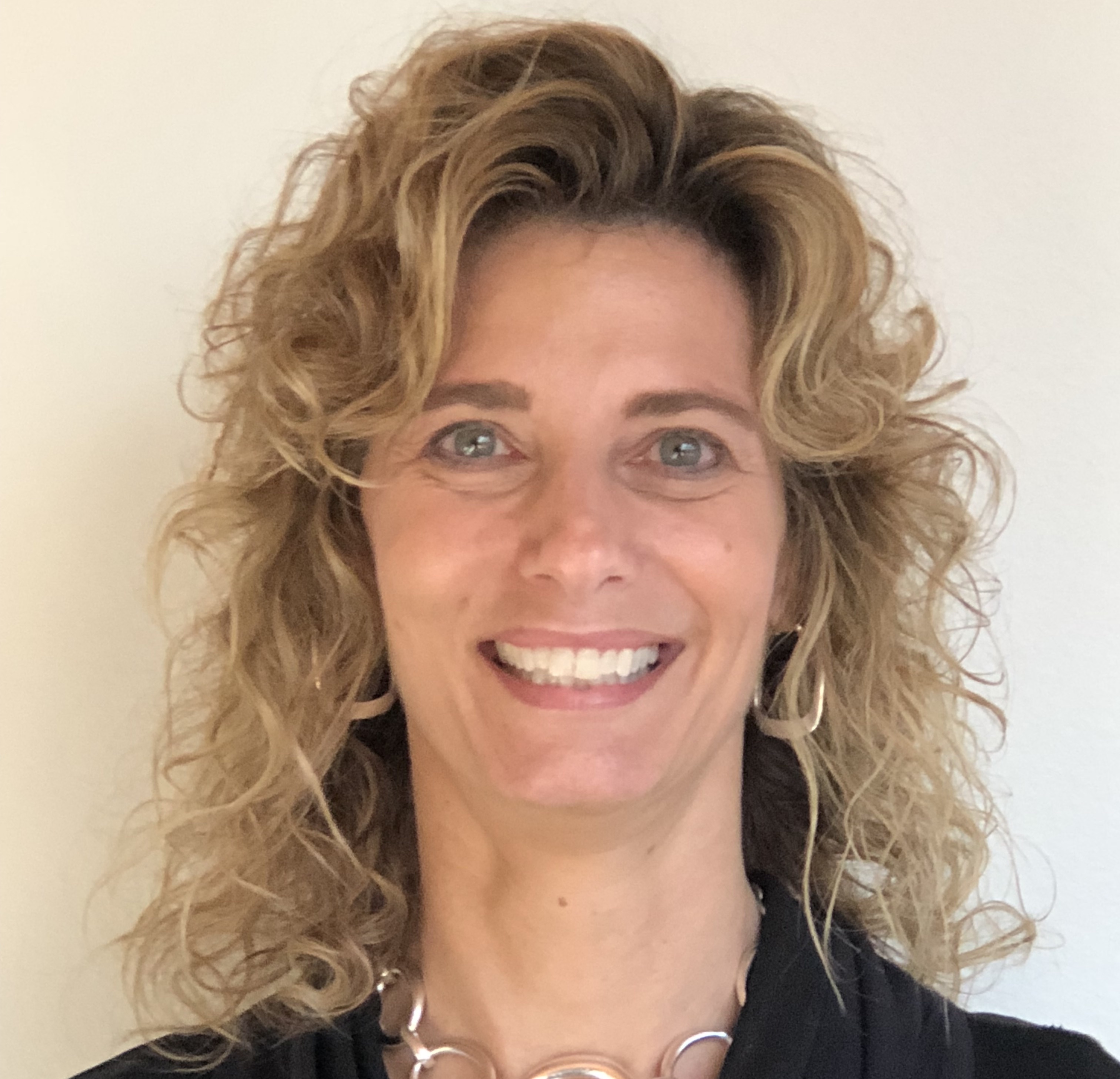
Joy Dettorre
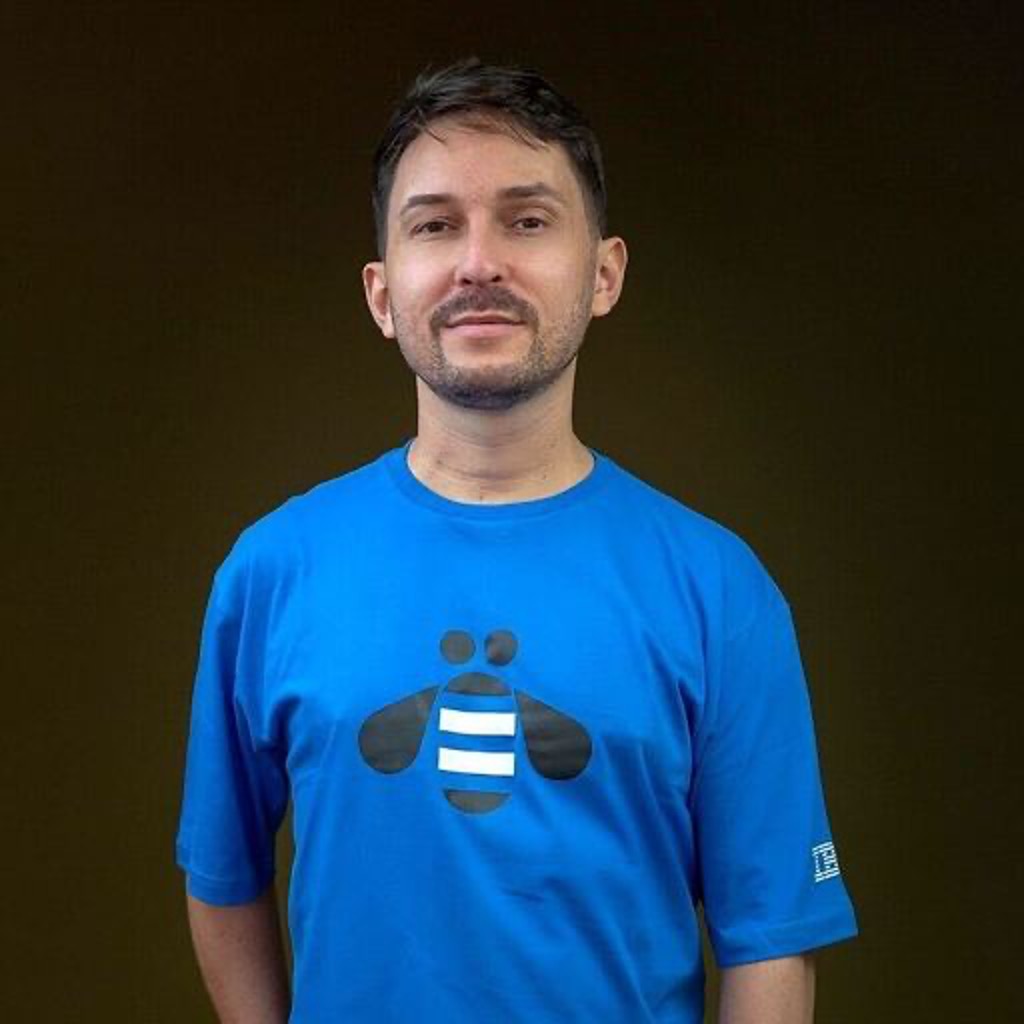
Luiz Lopes
Today's Guests
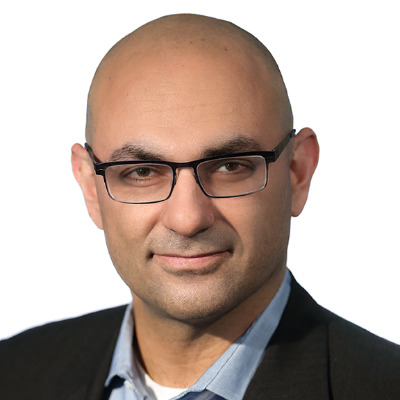
Rafi Ezry
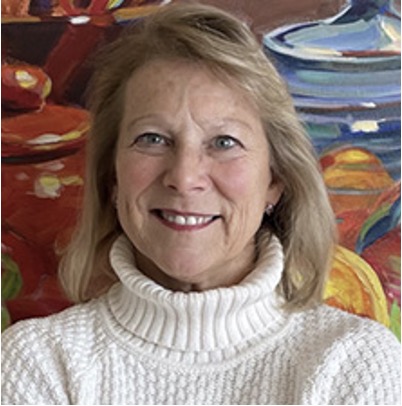
Julie McDougal
